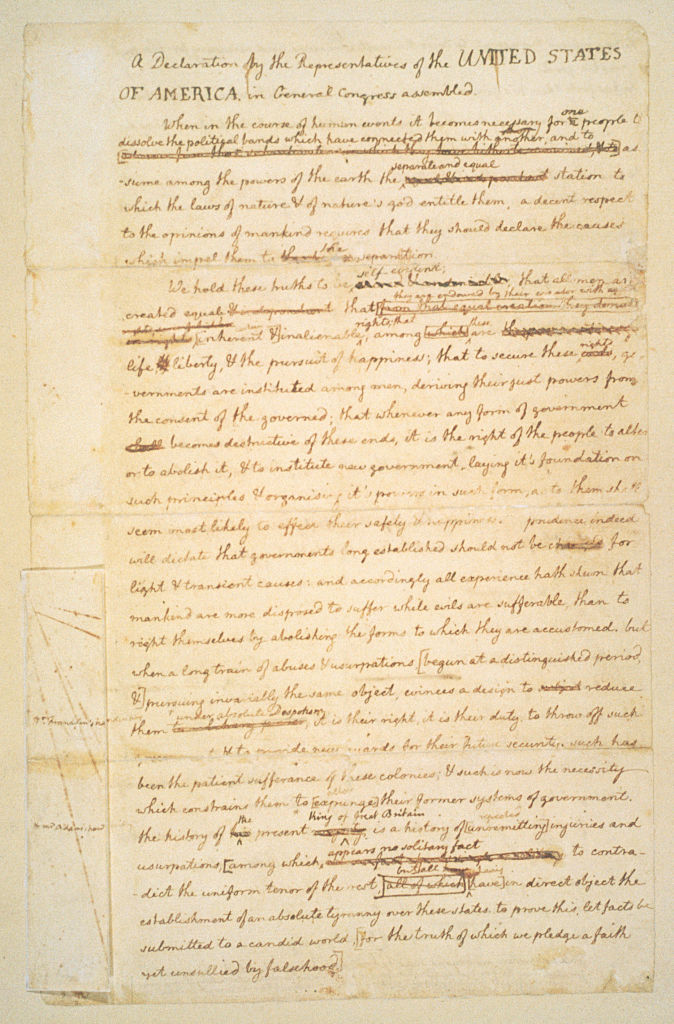
It’s the most famous sentence in the Declaration of Independence, and perhaps in all of American history: “We hold these truths to be self-evident,” Thomas Jefferson wrote in 1776, “that all men are created equal, that they are endowed by their Creator with certain unalienable rights, that among these are life, liberty, and the pursuit of happiness.”
Governments exist to secure people’s rights, Jefferson continued. When governments no longer do so, the people have a right to cast those governments aside and form new ones. “To prove this,” the document says, “let facts be submitted to a candid world.”
Truths. Self-evident. Facts. Yet, on Independence Day 2022, these words also stand out as starkly anachronistic. In an era of social media, misinformation, disinformation, “fake news,” and extreme partisanship, what “truths” can be considered “self-evident”? Can “facts” simply be submitted to a candid world? What do such sentences mean for us in today’s political climate?
Read more: How Your Brain Tricks You Into Believing Fake News
Today, the information about the past we encounter online is increasingly shaped by algorithms, platform designs, crowd-sourcing, and disinformation campaigns. The success of these pieces of e–history often has little to do with facts or truths. Indeed, an argument can be made that a world of facts has been superseded by a world of beliefs. With so much information available to each of us, we no longer require—and, indeed it may not be possible to have—a shared set of facts or self-evident truths. We each re-write our personalized realities each day, curated from fragments of information scattered across the web and surfaced to us by recommendation engines. We forge our own realties, finding ample justifications for why we believe each reality is self-evident.
To expert-centric fields of knowledge, such a world poses many threats. As historian Jill Lepore wrote in The New Yorker in 2016, so much of our modern world—from law and science to history and journalism—has been shaped and ordered by “the fact,” the notion that something could be definitively known. Our independence, Jefferson made clear, also relies on that premise. As Lepore wrote, “the origins of no other nation are… as answerable to evidence,” as the United States.
If the world of facts is collapsing, perhaps that is also why the very foundations of the American experiment feel on shaky ground. Our very existence is tied to a world of facts and self-evident truths. A national history is, after all, an imagined agreement on facts shared by a diverse group of people. When those agreements become unraveled, we must find new ones—and, indeed, we are in the midst of such a tumultuous process.
In the public sphere each day we argue about which pieces of information, assembled in which order, reveal which self-evident truths that should become the basis for our actions. Depending on what evidence you assemble in what order, conservatives and progressives can each demonstrate to each other a compelling belief system that is self-evident, supported by facts, and threatened by “repeated injuries,” “usurpations,” and “tyranny” of the other side—words that Jefferson used 246 years ago.
While social media and the web have radically re-ordered our world, they are not solely responsible for ushering in the post-truth, post-fact era. The shifting sands beneath our feet have a much longer history, as Lepore summarized in that article, that includes postmodernism, relativism, and fundamentalism. And now, the era of self-evident truths is past, and a new era of arguments and beliefs upon us.
Though this may feel treacherous, it also offers us an opportunity to cast the old American story aside and forge a new one—not based on a static foundation of facts passed down to us from the founders, but on a new set of beliefs about human rights and human dignity that can propel us forward in the decades ahead.
Regardless of what America has been in the past—in all its glories and failures—the Fourth of July affords us a chance to articulate a new set of beliefs about why we exist and why we deserve to be an independent nation. Some of Jefferson’s words remain quite useful for that exercise: equality, inalienable rights, life, liberty. A government whose mandate is to safeguard the security of those who give it legitimacy. Whether or not those beliefs are factual, true, or self-evident in today’s America is secondary to forging an agreement that they are, nevertheless, worth fighting for.
Jason Steinhauer is the author of History, Disrupted: How Social Media and the World Wide Web Have Changed the Past and the History Club newsletter.
More Must-Reads From TIME
- The 100 Most Influential People of 2024
- The Revolution of Yulia Navalnaya
- 6 Compliments That Land Every Time
- What's the Deal With the Bitcoin Halving?
- If You're Dating Right Now , You're Brave: Column
- The AI That Could Heal a Divided Internet
- Fallout Is a Brilliant Model for the Future of Video Game Adaptations
- Want Weekly Recs on What to Watch, Read, and More? Sign Up for Worth Your Time
Contact us at letters@time.com